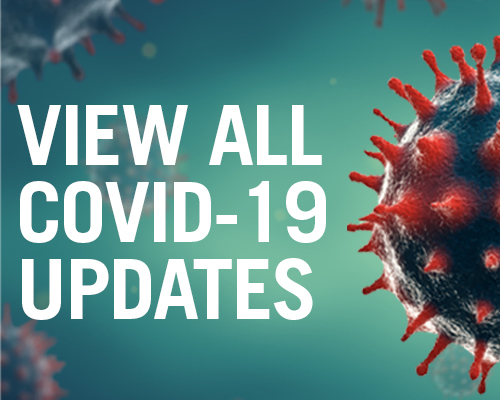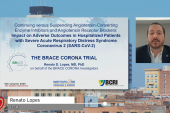Continue ACE Inhibitors/ARBs in COVID-19, New Study Confirms
The meta-analysis shows patients had a lower risk of death and AEs with RAAS inhibition, particularly hypertensive patients.

The new data, published this week in JAMA Network Open, show that after adjusting for multiple variables, COVID-19 patients treated with ACE inhibitors and ARBs had a significantly lower risk of death and severe adverse events, which include the need for intubation, mechanical ventilation, or admission to the ICU, when compared with those not receiving the renin-angiotensin-aldosterone-system (RAAS) inhibitors.

Senior investigator Vassilios Vassiliou, MBBS, PhD (University of East Anglia, Norwich, England), said it’s become increasingly clear that patients already taking an ACE inhibitor or ARB should continue taking the drugs if they become infected with COVID-19. That recommendation is currently supported by a wide range of professional societies, among them European, American, and international bodies.
“I hope it reassures everybody and we can draw a line and say, 'There are absolutely no concerns about ACE inhibitors or ARBs. If you have been prescribed these medications, you should carry on taking them.'” said Vassiliou. “Not only are they not harmful, but there is a signal that they can be quite beneficial too.”
To TCTMD, Vassiliou recapped some of the earliest unknowns about RAAS inhibition and COVID-19, noting there were a lot of hypothetical concerns in March and April last year. The theoretical risk for patients taking ACE inhibitors or ARBs was a possibility of upregulating angiotensin-converting enzyme 2 (ACE2) in the lungs. That was potentially concerning because the ACE2 receptor acts as a binding site for the virus to gain entry into the cells. With ACE2 upregulated, it meant the virus might enter the body more easily.
“Unfortunately, this theoretical risk was picked up by the press quite a lot. In the UK and globally, a lot of patients either asked to come off their ACE inhibitors [and ARBs] or unilaterally made the decision to stop their medication,” said Vassiliou.
Some of the earliest observational studies did suggest that patients taking an ACE inhibitor or ARB were at a higher risk of death or adverse events from COVID-19 compared with those not taking the medications. Those studies, however, were followed by more and more reports showing there was no association between use of RAAS inhibitors and adverse clinical outcomes. Other studies even suggested the drugs might be beneficial, especially for patients with hypertension.
The randomized trials published to date have focused on patients hospitalized with COVID-19 and these data also support the continued use of RAAS inhibitors. For example, the BRACE CORONA trial, which was presented last year at the European Society of Cardiology Congress, showed that hospitalized patients with COVID-19 who continued on their previously prescribed ACE inhibitors and ARBs were not at an increased risk of dying or remaining in the hospital when compared to patients who stopped the medication. The REPLACE COVID trial, which was published just a few months ago, came to a similar conclusion.
More Than 100,000 Patients
This newest meta-analysis includes 101,949 patients, of whom 26,545 were taking an ACE inhibitor or ARB, enrolled in 40 cohort studies, six case series, four case-control studies, one randomized clinical trial, and one cross-sectional study.
In the unadjusted analysis, there was no increased risk of death among those treated with an ACE inhibitor/ARB in the overall cohort. In the unadjusted subgroup analysis, use of a RAAS inhibitor was associated with a significantly lower risk of death in those with hypertension, but a significantly higher risk in those with multiple comorbidities. In the fully adjusted model, however, use of an ACE inhibitor/ARB was associated with a significantly lower of death in the overall cohort (OR 0.57; 95% CI 0.43-0.76), and this reduction was seen in patients with hypertension (OR 0.51; 95% CI 0.32-0.84) and in those with multiple comorbidities (OR 0.64; 95% CI 0.46-0.88).
I hope it reassures everybody and we can draw a line and say, ‘There are absolutely no concerns about ACE inhibitors or ARBs.’ Vassilios Vassiliou
With respect to adverse events in the adjusted analysis, use of a RAAS inhibitor was associated with a decrease in severe events in the overall cohort (OR 0.68; 95% CI 0.53-0.88). That reduction in risk was statistically significant in patients with hypertension (OR 0.55; 95% CI 0.36-0.85), and while there was a trend toward a lower risk of severe adverse events in those with multiple comorbidities, that reduction didn’t reach statistical significance (OR 0.79; 95% CI 0.59-1.07).
“What’s become clear is that as we drill into the data, once you start adjusting for the various comorbidities, it’s actually the comorbidities that are associated with mortality,” said Vassiliou. “Things like diabetes, any form of cardiovascular disease—such as hypertension, heart failure, myocardial infarction, atrial fibrillation—or even renal failure, increasing age, and frailty are also important. Those are the things that lead to higher mortality and adverse events associated with COVID-19.”
To TCTMD, Vassiliou said this meta-analysis has a number of strengths, some that weren’t available in other observational studies. For instance, it includes patients from China, North America, and Europe, as well as a large sample size. “I think the statistical significance of the results are there,” he said. “We’re not just picking a positive P value. The effect is quite huge.” And while the meta-analysis is observational and subject to inherent limitations, “it is quite definitive in terms of the evidence provided,” he said.
Michael O’Riordan is the Managing Editor for TCTMD. He completed his undergraduate degrees at Queen’s University in Kingston, ON, and…
Read Full BioSources
Baral R, Tsampasian V, Debski M, et al. Association between renin-angiotensin-aldosterone system and clinical outcomes in patients with COVID-19: a systematic review and meta-analysis. JAMA Network Open. 2021;4(3):e213594.
Disclosures
- Vassiliou reports grant support from the Norfolk Health Trust and personal fees from Daiichi Sankyo and Novartis.





Comments